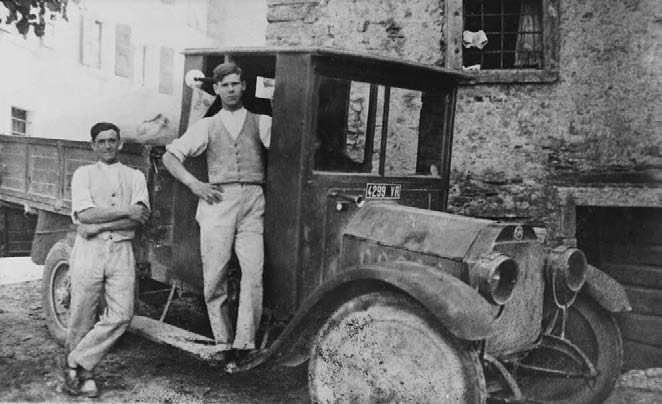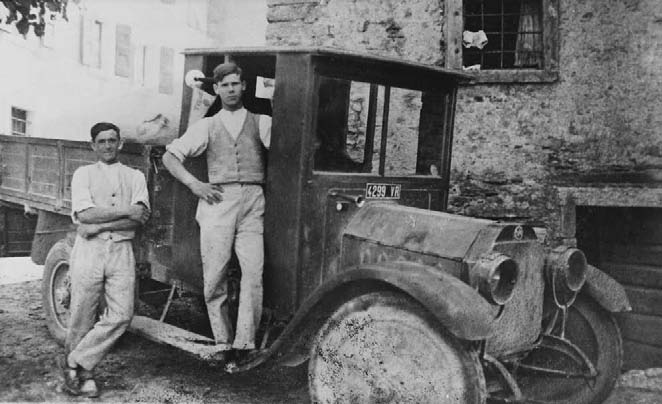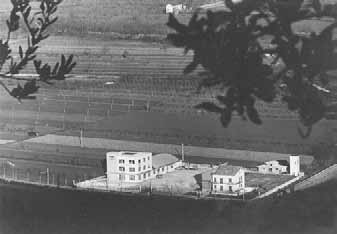

Apollinare Veronesi, a visionary twentieth-century pioneer
He was a true innovator, a visionary with his feet firmly planted on the ground. Apollinare Veronesi’s life and career were marked by a fascination for new discoveries, and by his simple values.
His life spanned most of the twentieth century. The retouched photographs and elegant handwritten notes he left behind as the digital age dawned show his profound impact on Italian society: not just at the dining table, but on the way people did business and transformed foods into brands. Those who knew Apollinare Veronesi also recall his habit of writing proverbs and maxims on pieces of paper.
His beautifully calligraphy expresses values that even today guide the lives and work of his company’s employees. This same simple wisdom, passed down through his family over five hundred years in the milling business, inspired Apollinare’s brilliantly intuitive approach to modern animal husbandry.
Apollinare led by example and, in so doing, laid the foundations of one of Italy’s biggest companies. He was a wise, humble man, a visionary who understood that people could make the difference to a company. “I want my employees to say we’re proud to work for Veronesi, because it’s a good place to work,” he said. “I want every last employee to feel they’re part of a family.” He was a man of action who disliked wasting time gossiping, and told his children: “Speak little, listen a lot.”
One photograph shows a 19-year-old Apollinare posing on the running board of a SPA truck that his family had acquired secondhand, perhaps even thirdhand, in 1930.

It had an Opel engine, and the bed was homemade. Apollinare and his two brothers were working for their father’s company, Veronesi Marcellino & Figli, in Lugo, near Verona. Apollinare was good with numbers, so he was in charge of the accounts: he was meticulous, recording everything faultlessly in a ledger.
The company did well and survived the war. At some time after 1945, Apollinare was photographed at the wheel of a Fiat 626 truck, just a simple cab and bed, in which he constantly travelled back and forth between the family’s mill and Genoa, where US vessels were unloading grain provided under the Marshall Plan. Italy was hungry: the war had brought misery, death, piles of rubble, and a black market. The Veronesi family expanded its business, buying a hydraulic press to extract oil from seeds.
Even at this early stage, Apollinare had developed a fascination with technology. In 1948 he visited a trade fair in Milan and fell in love with a Diefenbach hydraulic press costing five million lire, a small fortune. But he saw its potential, and had it transported on a now-legendary journey to the mill near Verona, where it proved a shrewd investment.
Around this time, Apollinare also worked as a sales representative in the province of Verona for a company named Vitasol, which made ultraviolet-treated brewer’s yeast. With the addition of vitamins, this made a healthy feed for cattle and pigs. The friendships and acquaintances he developed with farmers and vets provided a valuable network of contacts with whom to share experiences and find ways of expanding his own business. His knowledge of animal feeds and farming grew significantly, not least because he travelled so widely, something that has become much less important to businesses these days.
In 1956 Apollinare visited a chicken farm in the Netherlands, and was amazed by its advanced technology. He went home convinced that meat was the cure for world hunger, and needed to be farmed on a grand scale.
On 1 May 1958, aged 47 and overcome with nostalgia for his native home, Veronesi bundled his wife and five children into their Fiat 600 and returned to Quinto, just north of Verona. Here, he converted the family’s first mill into a feed factory and built a small white two-storey home, where the family continued to live even after he had made his fortune.

Many years later, a TV news programme showed Veronesi in his eighties, standing outside this same house, where he still lived, wearing gold-framed teardrop glasses and smiling broadly. “The noise of the trucks and the din from the factory over there are music to my ears,” he said.
It was time to move into farming. Italians were fascinated by the large-scale chicken rearing techniques being used in America, and Apollinare realised this was where the future lay, so he went to see for himself, asking questions and taking notes. He learned a lot in the United States, and his brand became a major force in the agrifood sector. Over the next ten years he diversified from feed into meat processing, and in 1968 he created AIA, Agricola Italiana Alimentare SpA. another brand that was to become famous in European food and agriculture.
Apollinare’s farsighted strategy led to a series of successful acquisitions from 1989 onwards, and in 1992 he built a factory at Zevio, near Verona. Completed in record time, it was one of the most advanced in Europe. His family helped him to run every aspect of the company, with children, nephews and nieces growing up in the simple family tradition. The business built more new locations, became a group, and created more major new brands including Montorsi, Fini Salumi, and Negroni. At its heart, the central focus of all its activities, was Veronesi Finanziaria SpA, run by Apollinare and his family as it had been right from the start.
The group goes back a long way, combining deep traditional roots with a constant stream of new ideas in production, logistics, distribution, and product communication. The difference lies in its ability to see things through new eyes, as Apollinare did.
“When I was 12, I used to help out at the watermill,” he recalls. “I walked round and watched my father giving free flour to the poor and elderly, and it made me curious. I was the next to last of ten brothers, and I often heard people talking about the need for economy at home and at work. One day I plucked up the courage and talked to him about it. We spoke quite formally in those days.
“I asked him why he didn’t keep a record of all the flour he’d given away, and I can still remember his reply: If people are hungry, they’ll repay you one day. The prior of a monastery came to see us once, and he told me exactly the same thing, which his parents had told him. I enjoyed working.”

Apollinare Veronesi created a brand that made its mark on twentieth-century Italy. This miller from the Valpentena region was a visionary. You can see pride on his face in that photograph of him as a young accountant standing on the running board of a truck and looking forward to the future. but there is modesty too.
Modesty pays




